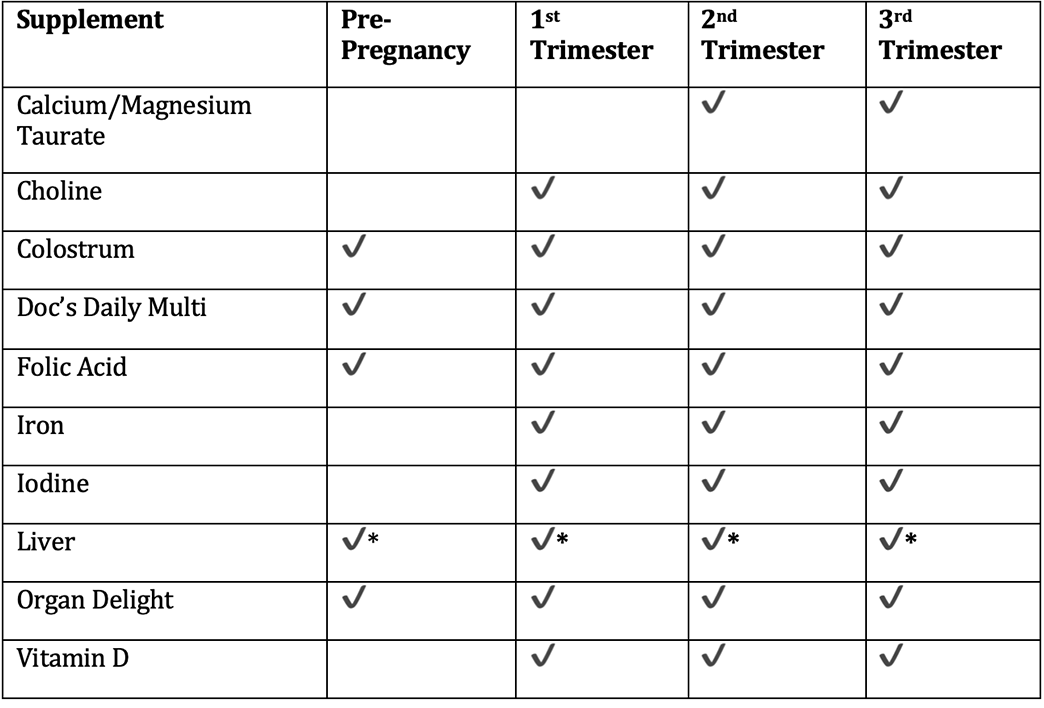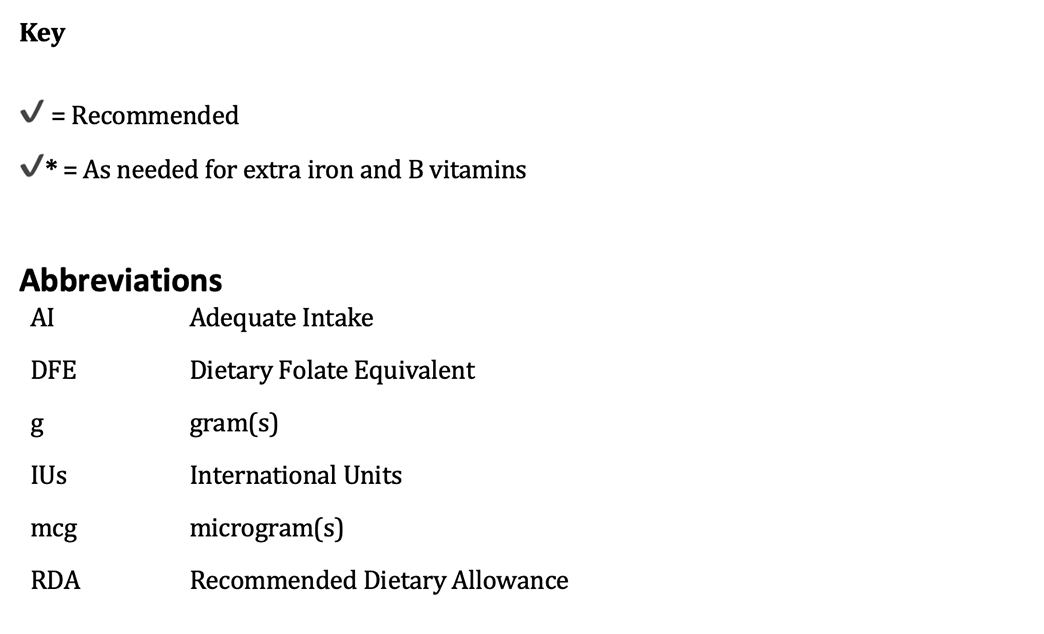As any mother will tell you, your body and dietary needs change greatly during pregnancy. Knowing which supplements are beneficial can prepare you for a healthier pregnancy. Here are some of the key vitamins and nutrients you’ll need up to delivery.


Calcium
According to the World Health Organization (WHO), calcium supplements benefit pregnant women’s musculoskeletal, nervous and circulatory systems. They are recommended to take 1.5-2.0 grams of calcium per day throughout pregnancy. The daily supplement should be divided into three and ingested with each meal. In terms of the pregnancy cycle, calcium should be taken at 20 weeks’ gestation and continued throughout pregnancy.
Choline
Choline is a vitamin important for restoring a pregnant woman’s nutrition. It’s also vital for fetal brain and spinal cord development. Women are advised to take 450 AI of choline per day according to the USDA’s Dietary Guidelines for Americans. (All dosages and nutritional information used in this article refer to these guidelines unless otherwise noted.)
Choline supplementation may be required for adequate nutrition. Not all prenatal supplements contain sufficient choline, so pregnant women are advised to consult their doctors.
Colostrum
Unlike other supplements on this list, colostrum is produced by the human body after giving birth. The nutrient-rich breastmilk is available for two to four days and is yellowish in color. Colostrum helps build a healthy immune system for newborn babies.
Colostrum is also available in supplement form. Pregnant women should note that it is normal to produce colostrum slowly and/or in limited quantities.
Doc's Daily Multivitamin
As the name implies, this multivitamin packs a punch with 29 essential vitamins and minerals. It's specifically formulated as a prenatal and post-natal vitamin, including B vitamins, magnesium, vitamin D, and vitamin E. Doc's Daily Multivitamin may be taken with other supplements.
Folate/Folic Acid
Folate, otherwise known as folic acid, helps prevent neural tube defects. Pregnant women are advised to take 600 mcg daily before conception and throughout the pregnancy. Folic acid is thought to be especially important for development during the first trimester.
Related Product: B Optimal, Doc's Daily Multivitamin and Liver
Iron
Iron is an important nutrient for healthy fetal development. It is recommended that women take 27 mcg/day for the entire term. Iron is one of the most recommended supplements during pregnancy based on high rates of deficiency. In fact, the USDA cites a 10% iron deficiency rate among pregnant women compared to 25% in the third trimester.
It is worth noting that animal-sourced iron is easier to absorb than plant-sourced supplements. Prenatal supplements often contain higher levels of iron suitable for pregnant women. However, these doses may exceed nutritional recommendations during lactation.
Related Product: Liver
Iodine
Iodine is a mineral that supports neurocognitive fetal development. The RDA is 200 mcg throughout pregnancy. As you may know, iodine is found in certain foods like iodized salt, dairy, eggs, and seafood. Women who do not ingest sufficient iodine through their diet are encouraged to supplement during pregnancy.
Certain prenatal vitamins may contain iodine. As with all supplements, read the label carefully to ensure sufficient intake.
Liver
You may have guessed that liver is not a nutrient or vitamin. However, women may consider taking a liver supplement for extra iron and B vitamins during their pregnancy.
It is also worth noting that Dr. Ron followed the nutritional teachings of Weston A. Price, DDS. According to the Weston A. Price Foundation, pregnant women should aim to consume 3-4 ounces of fresh liver once or twice a week. Dr. Ron’s Organ Delight fortifies the body with nutrients from lamb, pork, calf, and beef — including beef liver — in convenient supplement form.
Magnesium
Magnesium is an incredibly important mineral for a healthy mother and child. That’s because insufficient levels during pregnancy are associated with restricted fetal growth, gestational diabetes, preterm labor, and pre-eclampsia. It is recommended that pregnant women ingest 350-400 mcg of magnesium per day during every trimester. Women may increase their intake through diet and appropriate supplementation.
Magnesium is available in multiple forms, including magnesium taurate. Dr. Ron’s Calcium & Magnesium Taurate combines several nutrients essential for a healthy pregnancy
Related Product: Mag Max and Doc's Daily Multivitamin
Vitamin D
Vitamin D helps support healthy bone development and prevent pre-eclampsia, according to the American Pregnancy Association. Women are advised to take 600 IUs/day according to USDA guidelines. While vegan supplements do exist, animal-sourced supplements are preferable for easier absorption.
Dietary Information
Many of the supplements required during pregnancy can be found in a healthy diet. Here are some tips on healthy eating during pregnancy.
Seafood
The USDA recommends that pregnant women include seafood in their diet for its benefits on children’s cognitive development. In particular, they’re advised to consume 8-12 ounces of seafood per week while limiting methylmercury. Certain types of seafood, such as swordfish and king mackerel, are discouraged due to their mercury levels.
Alcohol-Free Drinks
Pregnant women should not drink alcohol at any time during their pregnancy in the interest of healthy fetal development. Once women have given birth, drinking during the lactation period is still cause for concern. Mothers may wish to consider alcohol-free options such as mocktails, tea, or juice.
Caffeine
Caffeine consumption is common during and after pregnancy. Even so, women should keep their consumption to a relative minimum. Generally speaking, pregnant mothers should ingest no more than 300 mg per day, which equates to two or three cups of coffee. Other sources like tea, chocolate, or energy drinks should also be considered to promote prenatal health.
Supplement Summary
Pregnancy is a world unto itself, and knowing what you need to have a healthy one may be challenging. So, feel free to keep this supplement guide as a handy nutritional reference.
Got any questions for us? If so, we’d love to assist. Give us a call or drop us a line for more information.